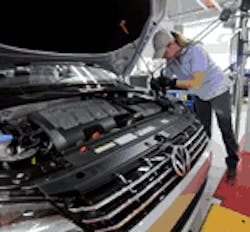Why is Tennessee a Hotbed for Manufacturing?
A lot of big-name companies are flocking to Tennessee. Within the past year, Volkswagen AG (IW 1000/10) opened a $1 billion plant in Chattanooga, and Nissan Motor Co. (IW 1000/29) announced it will be building Mercedes-Benz engines for the first time in the United States. Meanwhile, Whirlpool Corp.'s (IW 500/59) new plant is pursuing LEED Gold certification and Bridgestone Metalpha U.S.A. Inc. expanded to enable a 10% daily output increase.
They join fellow manufacturers Johnson Controls Inc. (IW 500/34), Dana Holding Corp. (IW 500/146), Procter & Gamble Co. (IW 500/10) and others.
The auto sector remains dominant. In fact, Tennessee sits at the No. 8 spot in auto production, and the industry accounts for 34% of manufacturing jobs with 105,000 employees. Adding up OEMs, suppliers and ancillary manufacturers, there are 864 auto-related companies in Tennessee.
Strengthening U.S. Base
Tennessee seems to be cashing in on the trend of non-U.S.-based companies to produce locally for the huge U.S. consumer market. Explaining Volkswagen's decision to locate in Tennessee, back in 2008, Stefan Jacoby, CEO of Volkswagen Group of America, said: "Today's decision is a fundamental part of our new strategic direction in the U.S."Supporting Existing Operations
Nissan chose to build upon its past success in the state. "There's no better plant to rise to the challenge than our top-quality manufacturing operations in Smyrna," said Bill Krueger, vice chairman, Nissan Americas.
A contributing factor to the high quality of manufacturing is the level of workforce skills. "My top priority is for Tennessee to be the No. 1 location in the Southeast for high-quality jobs," said Tennessee Gov. Bill Haslam. "Our Jobs4TN plan is a blueprint for doing just that. By leveraging our existing assets in each region, we will be able to attract new businesses to the state while helping our existing businesses expand and remain competitive. We will also be making significant investments in innovation to position Tennessee as a national leader well into the future."
Part of the investment includes a $20 million grant from the National Science Foundation to boost the state's energy-related research and education efforts. A coalition of scientists, faculty and students from 11 public and private universities in Tennessee and Oak Ridge National Laboratory will be grouped together into "network nodes" for conducting research, mentorship and outreach.
Clean energy is one of the sectors that Memphis is looking to expand."In addition to servicing our current manufacturing areas from an economic gardening perspective, we will look to recruit new manufacturing operations in pharmaceutical, diagnostics and clean energy," said Ted Townsend, ECD regional director for the Greater Memphis Region.
Other education initiatives are directed at the leadership side, which has been getting a push from Chuck Parke, executive director, Center for Executive Education, University of Tennessee, and a veteran of TRW, Maytag and Whirlpool. "One of the reasons that manufacturing is finding success in Tennessee is the concerted decision by the community at large to create and support good leadership."
As always, cooperation between private and public enterprises is essential to both attracting and keeping companies."We need to be competitive, prepared for growth and have the incentive packages ready to bring to the table. Fortunately, we have business and government leaders in this community who understand this," explains James Chavez, CEO of the Clarksville-Montgomery County Economic Development Council.

